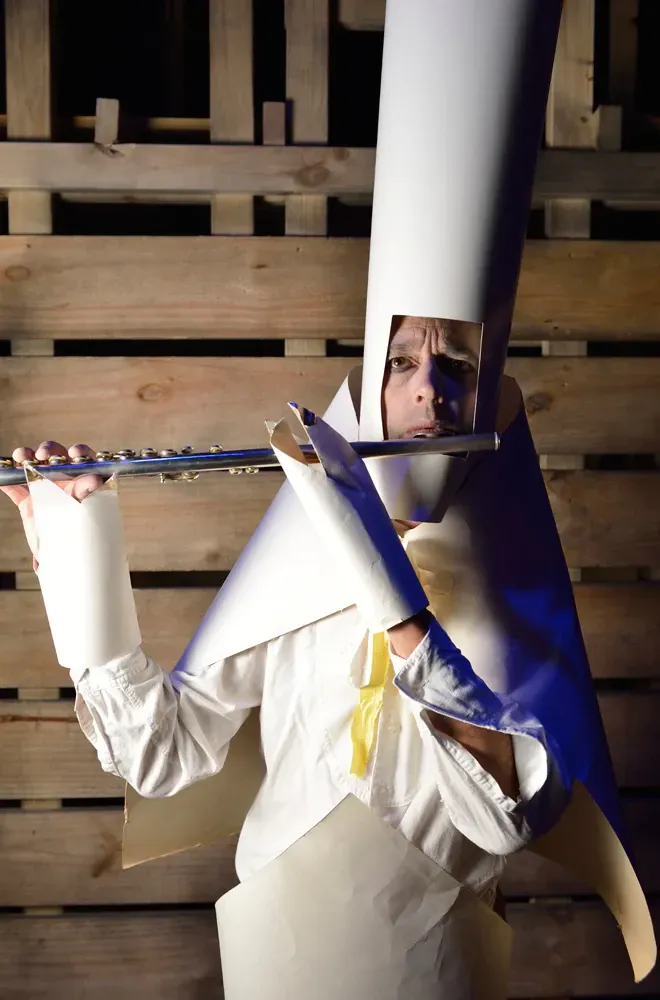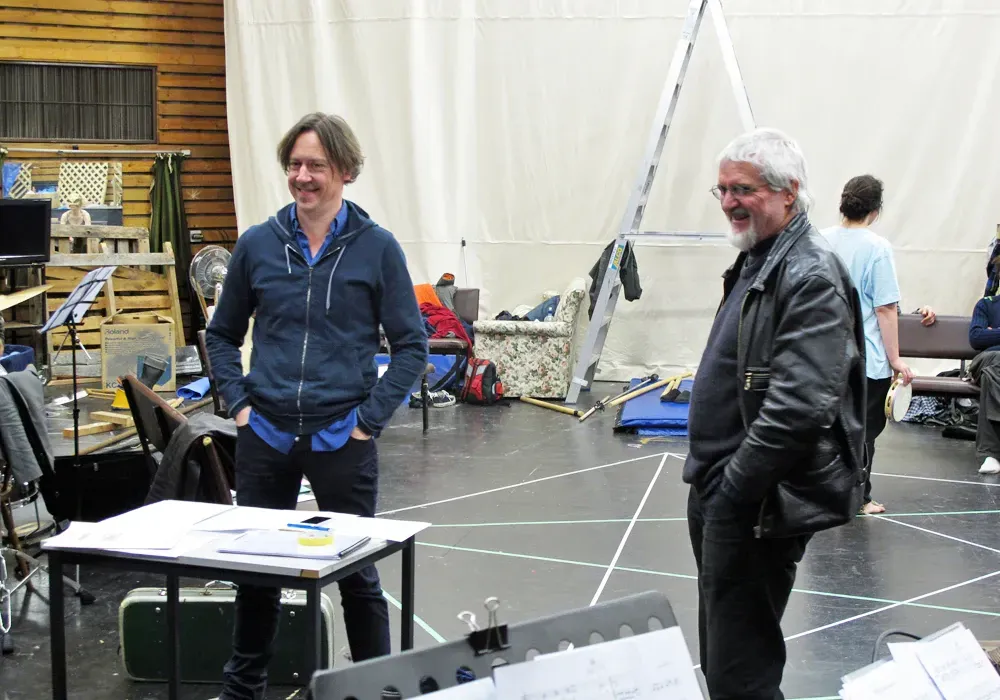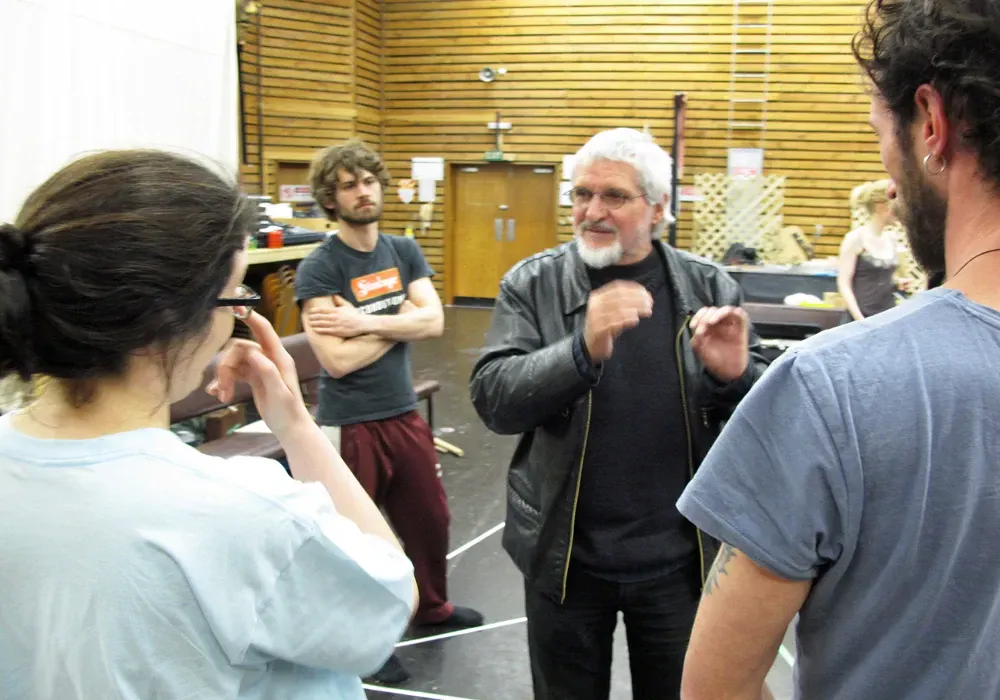Blurring musical boundaries
Written by

The Mauricio Kagel Project brings together international composer Gao Ping, NZ conductor Hamish McKeich and Christchurch experimental performance artists.
Free Theatre director Peter Falkenberg talked to Dione Joseph about this unconventional playful work, at Christchurch Arts Festival this week.
* * *
Peter Falkenberg admits the work of Argentine-German composer Mauricio Kagel is almost never performed these days – but when he first heard the score, its playfulness attracted him.
“I saw a Kagel work years and years ago,” he reminisces. “It was such fun but also such a liberating experience to see these people in their tails and formal attire playing (and playing with) these instruments, literally diving in and out of pianos, but at the same time playing quite complicated music.”
For those unfamiliar with Kagel, Falkenberg draws close parallels to John Cage. In case you were wondering, he’s the chap who put blue tack in the piano.
As Falkenberg explains, anyone who has heard the music of John Cage is familiar with the idea that any noise can be made into music.
"It's not a mishmash of sound, nor is it improvised nor is it just people making random noises. It's actually very highly curated.”
Even if you haven’t heard of Kagel (or John Cage) fear not. Mauricio Kagel spent his entire life trying to understand what music means, and as Falkenberg points out, although he never did find out - the search was worth it.
The Mauricio Kagel Project, or as it has colloquially come to be known The Kagel Project, is such an exploration. The tradition of the musical fair will bring the Arts Centre’s gym alive with the talents of local performers, as well as renowned concert pianist-composer Gao Ping and conductor Hamish McKeich. Together they will create a dynamic conversation between the avant garde, the very low and the very high art. As Falkenberg insists “it is a clash that can be very comic” but as he adds, with a smile, “that's what dada cabarets did and so did the best performers.”
Kagel himself was fascinated by the notion of instrumental theatre. He believed “that performers are not merely servants of the instruments but they are actually actors in a theatrical show” and bringing together the talents and skills of exceptional artists such as Ping, McKeich and local Christchurch experimental performers the work promises to blur the boundaries of the conventional.
Audiences will have the opportunity to go from booth to booth and they can follow certain performances, observe multiple acts happening simultaneously. As Falkenberg says, if they like, the audience too can make noise.
"They don’t have to participate but they are invited to make music by for example, walking on surfaces”.
There will be loudspeakers ‘selling the unsellable’ along with self-made instruments and an opportunity to allow “the imagination to tease one’s rationale faculty”.
As opening night draws closer Falkenberg is looking forward to sharing the work of the company and its collaborators with Christchurch audiences. “I think New Zealanders have an attitude of DIY and these instruments are made by us – and audiences can make them too and also try them out as part of this fair – we look forward to sharing with our audiences.”
The work also has a particular resonance for the city.
“In post-quake Christchurch we as a city need to start to reassemble from the chaos,” says Falkenberg, “But we can do so in a way we actually aim for a very highly organised constructed chaos and make it into something that can be enjoyed and productive.”
Over the past three weeks musicians have been coming together to create and interpret Kagel's notations, but also to work with his ideas and create new music. It is important, reminds Falkenberg, that “musicians have to see that they don't need to act as such, but they do need ‘to do’ and be conscious of their doing.”
This is more than a mere revival of famed post war composer’s highly sophisticated score and notation – this work is ‘New Zealand New’ and deserves to be as popular as anything else we apply our DIY attitude to.
“For people in NZ this is our take on 'NZ new' and we’re using Kagel as the starting point,” explains Falkenberg.
“For example, Gao Ping is an internationally renowned artist and he lived here in Christchurch for many years; and like McKeich who is based in Wellington, it’s wonderful to have such collaborators with our local artists.”
Mauricio Kagel once said, ‘We are lucky! In the moment of hearing, we are lucky!’ The Kagel Project offers audiences that unique moment to experience the marvels of composition, to revel in what Kagel himself called, a ‘state of grace’.
- The Mauricio Kagel Project is on September 10 - 11 at Christchurch Arts Festival

